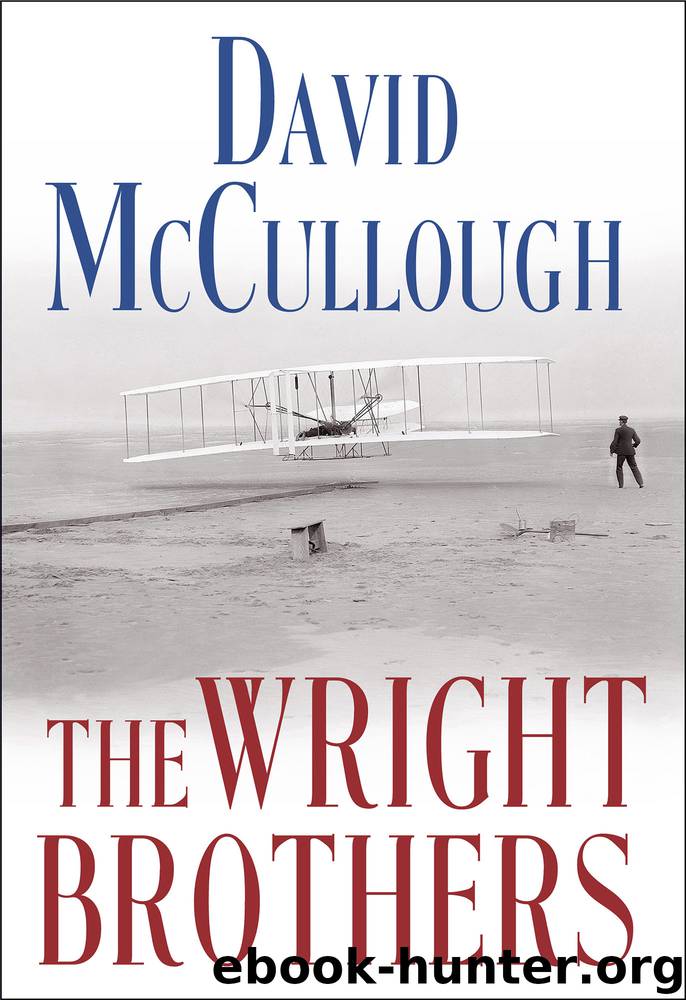The Wright Brothers by David McCullough

Author:David McCullough
Language: eng
Format: epub, mobi, azw3
Publisher: Simon & Schuster
With the mounting popular excitement over the news from Le Mans came increasing curiosity about the man making the news. The Wright machine had been shown to be a reality. But what of the American flying it? Of what sort was he?
Correspondents and others on the scene did their best to provide some clues, if not answers. In a memorable portrait written for the Daily Mail, Joseph Brandreth seemed a touch uncertain whether he liked Wilbur. (Nor, it is known from a letter he wrote to Katharine, did Wilbur much like him.) Brandreth was struck most by how greatly Wilbur resembled a bird, an odd bird. The head especially suggested that of a bird, “and the features, dominated by a long prominent nose that heightened the bird-like effect, were long and bony.” From their first meeting, Brandreth wrote, he had judged Wilbur Wright to be a fanatic.
A writer for Le Figaro, Franz Reichel, fascinated with the flecks of gold in Wilbur’s eyes, came to much the same conclusion. “The flecks of gold,” wrote Reichel, “ignite a passionate flame because Wilbur Wright is a zealot.
He and his brother made the conquest of the sky their existence. They needed this ambition and profound, almost religious, faith in order to deliberately accept their exile to the country of the dunes, far away from all. . . . Wilbur is phlegmatic but only in appearance. He is driven by a will of iron which animates him and drives him in his work.
Without wanting to diminish the value of French aviators, Reichel wrote that while Wilbur Wright was flying, they were only beginning to “flutter about.”
Léon Delagrange, who before becoming an aviator had been a sculptor and painter, could not help puzzling over what went on behind Wilbur’s masklike countenance, and, being French, found it hard to comprehend or warm to someone who seemed so devoid of the elemental human emotions and desires. “Even if this man sometimes deigns to smile, one can say with certainty that he has never known the douceur [sweetness] of tears. Has he a heart? Has he loved? Has he suffered? An enigma, a mystery.”
That said, Delagrange openly declared in the article he wrote for L’Illustration, “Wilbur Wright is the best example of strength of character that I have ever seen.
In spite of the sarcastic remarks and the mockery, in spite of the traps set up from everywhere all these years, he has not faltered. He is sure of himself, of his genius, and he kept his secret. He had the desire to participate today to prove to the world he had not lied.
To François Peyrey, who had seen more of Wilbur than had others and knew more, he was “un timide”—shy, a simple man, but also a “man of genius” who could work alongside the men of the Bollée factory, just as he could work entirely alone, who could cook his own meals and do whatever else was necessary under most any conditions and quiet by nature. He went his way always in his own way, never showing off, never ever playing to the crowd.
Download
The Wright Brothers by David McCullough.mobi
The Wright Brothers by David McCullough.azw3
This site does not store any files on its server. We only index and link to content provided by other sites. Please contact the content providers to delete copyright contents if any and email us, we'll remove relevant links or contents immediately.
Tools of Titans by Timothy Ferriss(8369)
Turbulence by E. J. Noyes(8040)
Secrets of Antigravity Propulsion: Tesla, UFOs, and Classified Aerospace Technology by Ph.D. Paul A. Laviolette(5368)
Astrophysics for People in a Hurry by Neil DeGrasse Tyson(5182)
Room 212 by Kate Stewart(5105)
Design of Trajectory Optimization Approach for Space Maneuver Vehicle Skip Entry Problems by Runqi Chai & Al Savvaris & Antonios Tsourdos & Senchun Chai(5066)
Pale Blue Dot by Carl Sagan(4996)
The David Icke Guide to the Global Conspiracy (and how to end it) by David Icke(4709)
A Journey Through Divination and Astronomy by Publishing Pottermore(4379)
Goodbye Paradise(3802)
Apollo 8 by Jeffrey Kluger(3704)
COSMOS by Carl Sagan(3618)
The Five People You Meet in Heaven by Mitch Albom(3562)
Losing the Nobel Prize by Brian Keating(3534)
How to Read Water: Clues and Patterns from Puddles to the Sea (Natural Navigation) by Tristan Gooley(3466)
Brief Answers to the Big Questions by Stephen Hawking(3430)
How to Read Nature by Tristan Gooley(3335)
The Order of Time by Carlo Rovelli(3188)
A Brief History of Time by Stephen Hawking(3022)
